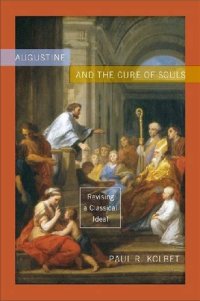
Ebook: Augustine and the cure of souls : revising a classical ideal
- Tags: Augustine -- Saint Bishop of Hippo. homilétique -- philosophie chrétienne -- philosophie grecque antique -- rhétorique -- Augustin (saint)
- Series: Christianity and Judaism in antiquity 17
- Year: 2010
- Publisher: University of Notre Dame Press
- City: Notre Dame, Ind
- Edition: 1
- Language: English
- pdf
Augustine and the Cure of Souls situates Augustine within the ancient philosophical tradition of using words to order emotions. Paul Kolbet uncovers a profound continuity in Augustine's thought, from his earliest pre-baptismal writings to his final acts as bishop, revealing a man deeply indebted to the Roman past and yet distinctly Christian. Rather than supplanting his classical learning, Augustine's Christianity reinvigorated precisely those elements of Roman wisdom that he believed were slipping into decadence. In particular, Kolbet addresses the manner in which Augustine not only used classical rhetorical theory to express his theological vision, but also infused it with theological content.
This book offers a fresh reading of Augustine's writings--particularly his numerous, though often neglected, sermons--and provides an accessible point of entry into the great North African bishop's life and thought.
"For someone who does not know Augustine well this book will be an excellent introduction to his thought from an absolutely crucial viewpoint. Augustine's preaching, teaching, and attempts to reach the minds and hearts of his congregation have been largely overlooked. This book has the great virtue of demonstrating why these were important." --Carol Harrison, Durham University
"In this insightful and lucid study Kolbet leads his readers across the boundaries of ancient philosophy, psychology, rhetoric, and theology. He examines the ancient practice of the 'cure of the soul' and charts its Christian appropriation by Augustine. The volume offers its own medicinal promise--the reordering of our contemporary understanding of early Christianity and its complex association with classical culture." --John Peter Kenney, St. Michael's College